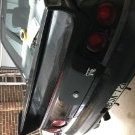Professional Engine Flush Advice
Announcements
-
Similar Content
-
Latest Posts
-
Not really, but the heater box is pretty simple mechanically....if the door is one way the air bypasses the heater core and if it is the other way it goes through it for warm air. If you are sure the actuator you moved manually is for the heater mix (there would also be one for output air direction) then I'd take the heater box out and see what is happening (you'll have to regass and re-coolant the systems afterwards) BTW pp724 onwards from the GTR workshop manual cover the system in good detail, it is probably worth checking. I think the IAT sensor might be a problem electrically for getting cold (if you got 24 error code not -24 it thinks the incoming air is -50c) and it covers how to test the sensor (although most likely it is either not plugged in or a wire is damaged)
-
By Dose Pipe Sutututu · Posted
Use the GKTech subframe bush and bring your subframe 10mm closer to the chassis. You'll need to fix an exhaust hanger to suit. One of the best mods I've done. -
You'd really have to pull it apart further to know, it least you can be confident that the one heading to the back is not connected any more. There was once a ground on the shifter seal mount too, your head unit issue could be that simple
-
By TurboTapin · Posted
Perfect, I'll get to it this winter then at the same time as I weld on my anti squat kit. -
By SeanR32GtSt · Posted
Alright so my 32 only has one temperature no matter what degree you set it to. I’ve tried disconnecting the servo motor arm and moving it either direction and got no change. I’ve fixed the leak in my AC and re charged it and with it on and clutch engaged it still blows hot even though the low pressure pipe going to the firewall is ice cold. Both heater core hoses are hot while running as well. Diagnostic code showed 24 for intake air temperature sensor. Anybody got any ideas?
-





Recommended Posts
Create an account or sign in to comment
You need to be a member in order to leave a comment
Create an account
Sign up for a new account in our community. It's easy!
Register a new accountSign in
Already have an account? Sign in here.
Sign In Now